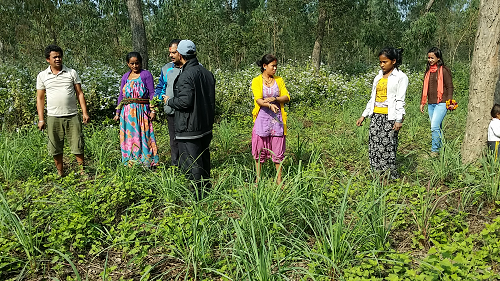
Description of the project: Three organizations in the central districts of Nepal -Kathmandu, Makwanpur, and Sarlah- are promoting aromatic herb plantation and essential oil production, ecotourism, and handicraft development in 13 community forests over 1,375 hectares. More than 4000 households benefit from the project, contributing to surveying the trees, revising forest management plans, and establishing plant nurseries in conjunction with economic activities. Community based ecotourism policies were strengthened, and three women-led forestry enterprises were successfully registered and operated, producing market-recognized forest products to improve local livelihoods.
Climate impact: These nepalese districts suffer from deforestation due to rapid population growth, overuse of fuelwood, and clear felling under electric lines. Participatory development of new plans demonstrating sustainable forest management (SFM) practices, alongside capacity-building through SFM training, effectively counters the deforestation. Nurseries have supported the planting of 175,000 trees, and the distribution of improved cookstoves, including biogas units, reduces future fuelwood demand. Ecotourism policy-strengthening has also provided a foundation for SFM to continue.
Gender impact: 551 women have directly benefited from trainings, economic opportunities, and received appliances. Basic and advanced handicraft training led to two profitable enterprises. Along with an aromatic herb plantation, these enterprises are generating income and giving women greater autonomy over their daily spending. SFM training has supported the equal involvement of women in community forest monitoring and management. The additional distribution of solar panels for lighting and improved cookstoves has enabled more time flexibility, reduced fuel-gathering labor, and improved health.
Scalability: This work is able to be replicated to support women’s economic upliftment in Nepal. The plantation of aromatic herbs is particularly identified as a model for replication. The Government of Nepal’s emphasis on eco-tourism promotion, forest based enterprises and SFM will contribute to the sustainability and scalability of this approach. To reach policy makers and other audiences in Nepal, a wide range of communication tools were employed, including local media coverage, brochures and documentary filmmaking.